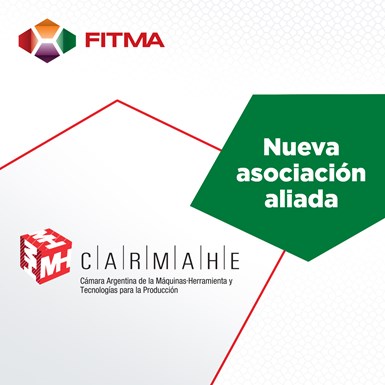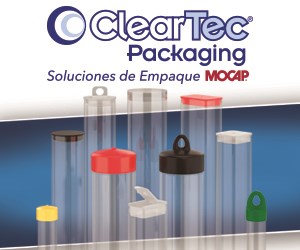CARMAHE Announces Its Support of FITMA
The Argentine Chamber of Machine Tools and Production Technologies (CARMAHE) has joined the specialized associations around the world participating in FITMA, the International Technology and Manufacturing Expo, June 22-24 in Mexico City.
The event will be hosted in the Mexican capital because of airline logistics and its position as the greatest consumer of machine tools in the world. FITMA will provide Latin American OEMs and suppliers of machinery, equipment, technology, and next-generation services with a meeting point for networking and training in their region and language.

CARMAHE was founded in 1956 and has 145 partners, of which 30% exclusively manufacture products of their own brands and 70% distribute international brands in addition to their internal production.
According to Florencia Vitale, vice-president of the CARMAHE, the composition of the metalworking sector in her country is varied, with the presence of large international companies that are optimized for Industry 4.0 throughout their production phases, and small to medium-sized businesses that are still in the process of updating their production technology.
“SMEs are generating 75% of the country's employment, so they are a very important engine in the economy,” Vitale says. “These small to medium-sized businesses are interested in updating their technology, but right now they have other concerns, other issues, and it is possible other priorities will be more important than modernizing today. They are implementing machines and technologies of the 4.0 Industry, but in one or two phases of their productive process, not in everything as it happens with the big companies.”
The metalworking sector in Argentina mainly serves the auto part, agricultural, oil, railway and white line industries. For this purpose, they have a diversified machine park, made up of turning centers, machining centers, bending machines, shears, welding machines, laser machines, equipment for robotic cells and automation elements.
“With this pandemic issue there are companies that are reinventing themselves and although they continue to be dedicated to their areas, they have also collaborated in the manufacture of sanitizing cabins, gel holders, beds – both for health centers and for therapies – and respirator parts,” Vitale explains.
CARMAHE’s directive adds that, in the context of this pandemic, the metal-mechanic sector is considered one of the most affected and has a more reserved recovery forecast. “We are sharing sectorial tables with the government, and the chamber is taking a very active role to help SMEs reactivate, boost their supply and demand, have a sustained growth and develop financing plans. It is very important for small businesses to become more technical and to be able to incorporate the latest technology to gain the competitiveness we all want,” Vitale says.
She also explains the Argentine economy and the metalworking sector were already going through a difficult time before the pandemic. However, for the companies of the sector associated with CARMAHE, “it is very important to incorporate technology and have the most advanced products and machines in the market because this generates competitiveness and better products at the best cost, increases the probability of exporting. This is what we want to increase in the SMEs: that they can be digitized and reactivated,” she added.
The Argentinean Machine Tool Sector
According to CARMAHE’s figures, Argentina’s consumption of machine tools due to cutting and forming was $232.5 million in 2018 — $12.1 million above the previous year, although below the $252.3 million that was consumed in 2015.
Figures reported for 2018 indicate production of machine tools for machining and forming reached $80.9 million of revenue, $19 million less than in 2017. Imports of these same items totaled $157.6 million in 2018, 18.5% higher than in 2017. China was the main origin of foreign purchases with $36.3 million, followed by Italy with $19.3 million and Germany with $18.0 million. These three countries concentrate around half of the imports to Argentina.
“The most imported tools were machines that operate by laser (18%), followed by stamping machines (15%). In third and fourth place were lathes (11%) and machining centers (10%), respectively,” CARMAHE’s report reads.
Argentinian exports of machine tools for machining and forming totaled $6 million in 2018, less than half of what was sold in 2017. Machines worth $1.6 million were exported to the United States and $1.2 million were sold to Mexico, an increase of 19%. The third largest buyer was Italy, with exports of $566,000, followed by Canada ($362,000) and Germany ($301,000).
Export sales of drilling machines and milling machines totaled $1 million each, a respective 291% and 137% increase compared to 2017. The third most exported items were shearing and punching machines, which were exported for $0.6 million — a 92% fall against 2017 according to CARMAHE’s economic report.
“At this moment it is noticeable that there is concentration on the internal market, but there’s always the Argentine policy was to promote exports. In fact, our trade balance has a surplus, but not in the metalworking industry. There are some statistics from the first quarter of 2020 where imports from the metalworking sector represent 24% and exports represent 18%. Therefore, we must promote manufacturing, support new companies and assemble new types of machinery,” Vitale concluded.
Lea a continuación
Sistemas innovadores de sujeción para electroerosión y mecanizado de tres ejes
Con el propósito de aumentar el índice de ocupación de máquinas en el taller, este fabricante de moldes adaptó un dispositivo de sujeción en sus máquinas de tres ejes y su electroerosionadora de penetración para aumentar la flexibilidad de sus equipos y ser más competitivo.
Leer MásMesas magnéticas optimizan la electroerosión en producción de piezas complejas
Evolución en Moldes venía asumiendo varios retos para el mejoramiento de sus procesos de manufactura de componentes complejos para sus moldes. La aplicación de mesas magnéticas optimizó el mecanizado por electroerosión y mejoró sus tiempos de entrega.
Leer MásPor qué usar torneado tipo suizo
¿Para qué clase de producción se usan los tornos tipo suizo? ¿En qué se diferencian de los centros de torneado convencionales? Expertos y usuarios cuentan sus experiencias.
Leer Más
















